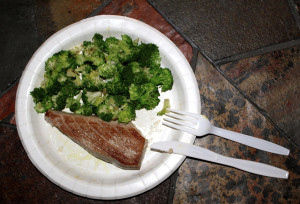
By: Rachel Gallego
The paleo diet, in simple terms, is what the cavemen ate. If you haven’t jumped on the bandwagon yet, you might be missing out on some major health benefits.
This modern nutritional plan suggests that you’ll be leaner and reduce your risk for diabetes, heart disease and cancer.
If our prehistoric ancestors didn’t eat it, diet rules say you can’t either. The paleo diet involves eating high-protein and high-fiber meals, without having to count calories. Foods include fresh lean meats, fish, fruits, vegetables, eggs, nuts and seeds. Foods to avoid are anything to do with farming, such as dairy, wheat and grains. This is because the paleo diet (like our ancestors) is all about “hunting-and-gathering” type foods. It does allow for some cheat days, which is anywhere from one to three meals per week. It just depends on how far you are willing to take this meal plan.
There has been some research on the health benefits of going paleo, but not enough to make any conclusions. Some researchers even go as far as saying this diet may improve athletic performance, because we are genetically made for it. The theory behind this is that our genes were made to survive a tough lifestyle in the ancestral age, so by eating as they did, we may be able to perform to that level as well.
Something to look out for is missing out on specific nutrients, such as Vitamin A, D and calcium from dairy products. You may need to take supplements, but before making any changes to your diet, talk with your doctor.

